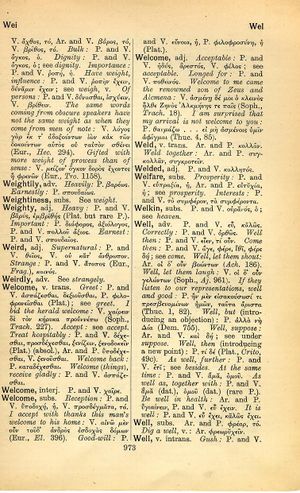well
English > Greek (Woodhouse)
adv.
Correctly: P. and V. ὀρθῶς.
Well then: P. and V. εἶεν, τί οὖν.
Come then: P. and V. ἄγε, φέρε, ἴθι, φέρε δή; see come.
Well, let them shout: Ar. οἱ δʼ οὖν βοώντων (Ach. 186).
Well, let them laugh: V. οἱ δʼ οὖν γελώντων (Soph., Aj. 961).
If they listen to our representations, well and good: P. ἢν μὲν εἰσακούσωσί τι πρεσβευομένων ἡμῶν, ταῦτα ἄριστα (Thuc. 1, 82).
Well, but (introducing an objection): P. ἀλλὰ νὴ Δία (Dem. 755).
Well, suppose: Ar. and V. καὶ δή; see under suppose.
Well, then (introducing a new point): P. τί δέ (Plat., Crito, 49C).
As well, further: P. and V. ἔτι; see besides.
At the same time: P. and V. ἅμα, ὁμοῦ.
As well as, together with: P. and V. ἅμα (dat.), ὁμοῦ (dat.) (rare P.).
Be well in health: Ar. and P. ὑγιαίνειν, P. and V. εὖ ἔχειν.
It is well: P. and V. εὖ ἔχει, καλῶς ἔχει.
subs.
Ar. and P. φρέαρ, τό.
Dig a well, v.: Ar. φρεωρυχεῖν.
v. intrans.
Gush: P. and V. ῥεῖν, ἀπορρεῖν, στάζειν (Plat. but rare P.), V. κηκίειν, ἐκπηδᾶν.
Of tears: P. and V. λείβεσθαι (Plat.).
Tears well from my eyes: V. ἐκ δʼ ὀμμάτων πηγαὶ κατερρώγασι (Eur., Alc. 1067).
Welling tears: V. χλωρὰ δάκρυα (Eur., Med. 922).
A welling spring of water: V. δροσώδης ὕδατος νοτίς (Eur., Bacch. 705).

